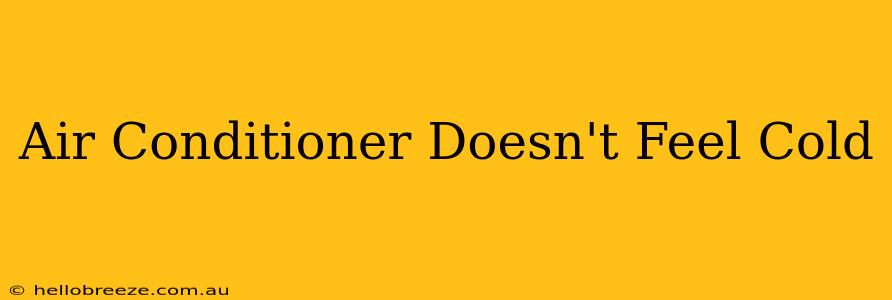Is your air conditioner blowing warm air instead of the cool relief you crave? A malfunctioning AC unit can be incredibly frustrating, especially during a heatwave. This comprehensive guide will walk you through the most common reasons why your AC isn't feeling cold and offer practical solutions to get your system back on track.
Common Reasons Why Your AC Isn't Cold
Several factors can contribute to your air conditioner not producing cold air. Let's explore the most frequent culprits:
1. Dirty Air Filter
This is the easiest and most common fix. A clogged air filter restricts airflow, preventing the system from efficiently cooling the air. Check your filter regularly (ideally every month) and replace it when it's dirty or clogged. A dirty filter can also reduce the lifespan of your AC unit, so regular maintenance is crucial.
2. Refrigerant Leaks
Refrigerant is the key component responsible for cooling the air. Leaks in the refrigerant lines will lead to insufficient cooling. This requires professional attention as finding and repairing refrigerant leaks needs specialized tools and knowledge. Don't attempt this yourself. A low refrigerant level is a strong indicator of a leak which can also cause your compressor to freeze up.
3. Frozen Evaporator Coil
A frozen evaporator coil is often a symptom of a restricted airflow problem, such as a dirty air filter or clogged vents. Ice build-up can prevent proper cooling. Turn off your AC unit and allow the ice to melt completely before attempting to run it again. Address the underlying airflow issue to prevent future freezing.
4. Problems with the Condenser Unit (Outdoor Unit)
The condenser unit, located outside your home, plays a vital role in the cooling process. Check for debris blocking the coils or fan. Clean the coils with a garden hose or specialized coil cleaner. A malfunctioning condenser fan motor also restricts cooling efficiency. This often requires professional repair.
5. Electrical Issues
A faulty capacitor, compressor, or other electrical components can significantly impact the cooling capacity of your AC unit. Listen for unusual noises coming from the unit. Strange humming, buzzing, or clicking sounds may indicate an electrical problem, requiring professional assessment and repair.
6. Thermostat Malfunction
Your thermostat controls the operation of your AC system. A faulty thermostat might not be sending the correct signals to the unit. Try replacing the batteries in your thermostat as a simple first step. If the problem persists, the thermostat itself might need replacement.
7. Incorrect Settings
Sometimes, the issue isn't with the AC unit itself but with its settings. Ensure your thermostat is set correctly to "Cool" mode and that the temperature is set lower than the current room temperature. Check if the fan setting is on "Auto" rather than "On" to allow the system to cycle on and off effectively.
When to Call a Professional
While some issues can be addressed with simple troubleshooting, others require the expertise of a qualified HVAC technician. Call for professional help if:
- You suspect a refrigerant leak.
- Your evaporator coil is frozen despite cleaning the filter and clearing vents.
- You hear unusual noises from the AC unit.
- You've checked the thermostat and settings, but the AC still isn't cooling.
- The problem persists after attempting basic troubleshooting steps.
Ignoring AC problems can lead to further damage and higher repair costs in the long run. Regular maintenance and prompt attention to issues will keep your AC running efficiently and provide you with cool comfort for years to come.

